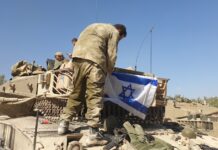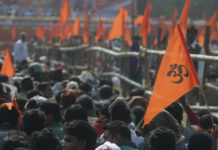Hizb ut-Tahrir held an event yesterday evening advising Muslim communities not to compromise their Islam in the aftermath of the Woolwich murder and the Islamophobic backlash that has followed.
Around 300 people attended the event at Water Lily, East London titled “Muslim community under pressure – How should we respond?”
The speakers included Chairman of the UK Executive Committee, Abdul Wahid, Media Representative Taji Mustafa and Economics expert Jamal Harwood.
Woolwich Murder
Mr Harwood began the event by describing the attack on Muhammed Saleem, the elderly Muslim who was murdered on his way home from the mosque in Birmingham. Harwood explained how there has been minimal media coverage and national outrage over this brutal and unprovoked incident.
Dr Wahid began his talk with some background information of the Woolwich incident and how it was a violation of the Islamic Shariah, but the behavior of Muslim leaders that followed was worse. He described how the non-stop condemnations only fed into the government’s agenda to ignore the real causes of the Woolwich murder.
He said: “Why are Muslims being asked to apologize and condemn? This act wasn’t done in our name, so why has the Muslim community become the punch bag?”
Subscribe to our newsletter and stay updated on the latest news and updates from around the Muslim world!
Condemnations of takfir
Mr Wahid said: “First it was apologies, then condemnations and then some went further to make takfir on the perpetrators.
“The least we as Muslims should have done was ask Allah to forgive them for their mistakes, not call them kafir.”
Mr Wahid explained how Muslim leaders that indulged in an apologetic and condemnation frenzy were getting themselves involved in a “dirty game”. This involved the “blamers” on one side – the government, its think tanks and the mainstream media and the Muslim community on the other side.
He said: “Basically, its a game where unless you, the Muslims condemn, you’re also guilty for what happened in Woolwich.
“So the secularists and moderates amongst the Muslim community went further and made takfir on the Woolwich perpetrators and began showing their support for British troops. This is a clear example of when people are scared, they’ll say too much.”
The main message of the opening talk addressed the dangers of continuous condemnations and how this will facilitate a stream of new draconian legislation that will be justified because of these apologies made by Muslim leaders.
Engage without compromise
There was a strong emphasis in the question and answer session about how Muslims should engage post-Woolwich murder. The speakers highlighted that we should take the example from the Prophet Muhammad (saw) who also engaged with the society of Makkah but without compromising Islam.
Dr Wahid narrated the following saying of the Prophet Muhammad (saw) who responded to his uncle Abu Talib when Quraysh made offers of “peace” based on compromise: “Whether you put the sun in my right hand and the moon in my left hand, I will never give up this call (Islam).”
He also recited the following verse of the Qur’an: “Call to the way of your Lord with wisdom and goodly exhortation, and discuss with them in the best manner.” Surah an-Nahl 16:125
From the above references, the speakers explained that this should be the method in which Muslims in Britain should engage with society, without compromising Islam to please the government, but at the same time with Islamic etiquette with the general public.
Extremism Task Force
The government’s new “Extremism Task Force” has stressed that mosques, madrassahs, universities, the internet and social media sites have to be monitored to tackle extremism and avoid incidents like Woolwich from occurring again.
However, the speakers argued that this is nonsensical. The Woolwich perpetrators weren’t “radicalized” in mosques or universities; rather it was the lack of clarity on fundamental concepts of Islam not being addressed in Muslim institutions that created people like Michael Adebolajo.
Dr Wahid said: “When fundamental concepts of Islam like jihad, Shariah, khilafah and siyasa (politics) are ignored to please the government, don’t be surprised when someone googles a question on jihad, reads an ayat of the Qur’an out of context and carries out something stupid like in Woolwich.
“When Muslim leaders persist on responding by saying ‘Islam is a religion of peace,’ all it takes is a non-Muslim to pick up the Qur’an or the books of hadiths to see that they’re lying. You can’t just equate the whole religion with peace.”
The speakers advised Muslim leaders, imams, mosques and institutions to start discussing and addressing controversial topics like the fiqh of jihad – its conditions, rulings and laws pertaining to warfare. Other concepts like Shariah, Ummah, siyasa and khilafah also have to be addressed openly.
Taji Mustafa said: “The way forward is having Islamic intellectual discourse with Muslims and non-Muslims, even on the “forbidden” topics. The situation that the Muslims are living in post-Woolwich is our test from Allah and we must remain firm.”
Hizb ut-Tahrir issued an advisory letter to community leaders after the Woolwich killing and a petition which pushes the idea to discuss concepts like jihad, Ummah, khilafah and Shariah in an open manner.






















